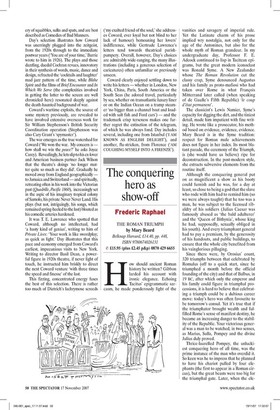The conquering hero as show-off
Frederic Raphael THE ROMAN TRIUMPH by Mary Beard Belknap Harvard, £14.40, pp. 448, ISBN 9780674026131 £15.95 (plus £2.45 p&p) 0870 429 6655 How should ancient Roman history be written? Gibbon larded his account with ironic elegance. Echoing Tacitus' epigrammatic sarcasm, he made ponderously light of the vanities and savagery of imperial rule. Yet the Latinate charm of his prose implied wry nostalgia, not only for the age of the Antonines, but also for the whole myth of Roman grandeur. In my undergraduate day, Professor F. E. Adcock continued to lisp in Tacitean epigrams, but the great modern iconoclast was Ronald Syme. A New Zealander whose The Roman Revolution cut the classy crap, Syme denounced Augustus and his family as proto-mafiosi who had taken over Rome in what Francois Mitterrand later called (when speaking of de Gaulle's Fifth Republic) `le coup d'etat permanent'.
The classicist's Lewis Namier, Syme's capacity for digging the dirt, and the tiniest detail, made him impatient with fine writing. He wrote like a prosecutor, his method based on evidence, evidence, evidence. Mary Beard is in the Syme tradition: respect for Roman male achievements does not figure in her index. Its most blatant parade, the ceremony of the Triumph, is (she would have us believe) ripe for deconstruction. In the post-modern style, she extracts subversive elements from the routine itself.
Although the conquering general put on as magnificent a show as his booty could furnish and he was, for a day at least, so close to being a god that the slave who rode with him had to remind him (so we were always taught) that he too was a man, he was subject to the licensed ribaldry of his soldiers (Julius Caesar was famously abused as 'the bald adulterer' and the 'Queen of Bithynia', whose king he had, supposedly, sexually obliged in his youth). And every triumphant general had to pay a premium, by the generosity of his handouts, and public buildings, to ensure that the whole city benefited from his vainglorious pillaging.
Since there were, by Orosius' count, 320 triumphs between that celebrated by Romulus (off to a quick start, since he triumphed a month before the official founding of the city) and that of Balbus, in 19 BC, after which only the emperor and his family could figure in triumphal processions, it is hard to believe that celebrating a triumph could be a dubious career move: today's hero was often favourite to be tomorrow's consul. Yet it's true that if the triumphator brought wealth and fulfilled Rome's sense of manifest destiny, he became an increasing danger to the stability of the Republic. Your victorious general was a man to be watched, in two senses, as Marius, Sulla, Pompey and the divine Julius duly proved.
Thrice-laurelled Pompey, the unluckiest conquering hero of all time, was the prime instance of the man who overdid it. So keen was he to impress that he planned to have his chariot pulled by four elephants (the first to appear in a Roman circus), but the great beasts were too big for the triumphal gate. Later, when the elephants were delivered to slaughter in the arena, the profane crowd was so moved by their pitiful trumpetings that it turned against Pompey, the ringmaster. His vanity had been flattered by the parade of an image of his own big head, made of pearls, among his show-piece trophies. Irony would be served when his actual severed head was handed, by Egyptian bountyhunters, to Caesar after the latter's victory at Pharsalus, in the Civil War.
Caesar's own greatest triumph was celebrated in 46 BC when it seemed that he had no enemies left to defeat, but spin required that its magnificence should not seem to crow over fallen Roman citizens. All the same, one of the tribunes refused to stand as Caesar was wheeled past his seat, a hint of the resentments that would culminate in Caesar being knifed (as the soap-opera plot required) at the foot of Pompey's statue.
Caesar's last triumph was a cardinal moment. Previously, patrician grandees used such occasions to 'give back' to the Republic what its armies had gleaned under their command. Buggins's turn allowed one victorious general after another his moment of triumph. But with the coming of the empire, only the emperor himself could be seen as the benefactor of the Roman people. What had once celebrated a national triumph was appropriated as an advertisement of the imperial regime. Buggins still sat in the Senate, but never again in a triumphal car.
With snappy scorn, Professor Beard approaches the unevenly evolving process of what 'Roman men (and I mean men)' got up to when on their highest horses. While she is very good on the way in which the triumph became showbiz and, with its monumental parades, headlined arches and rented eulogists, prefigured the modern spin-doctored Historical Event, her refusal to be impressed becomes itself triumphant. Rather as Ovid parodied the triumphal vocabulary in affecting subjection only to love's chariot, Beard mocks the long tramp of Roman militarism.
Her whole drive is to mount a feminist triumph over those 320 triumphators and anyone who dares to question her intellectual imperium. Hence the train of amici whose important names warn off the critical; hence the bibliographical intimidation (odd that Paul Veyne, and his magnum opus on bread and circuses, should be uncited); hence the blurb that reminds us not only of her Cambridge chair, but also of her proconsular control of the TLS classics section: who crosses Beard, we are warned, would better cross the Rubicon. If only her prose marched with a classier step, if only the clichés, excessive adverbs, repetitions and solecisms had been dismissed the service, how wholeheartedly she might be cheered on her way! As it is, one tribune at least feels obliged to remain seated.





































































 Previous page
Previous page